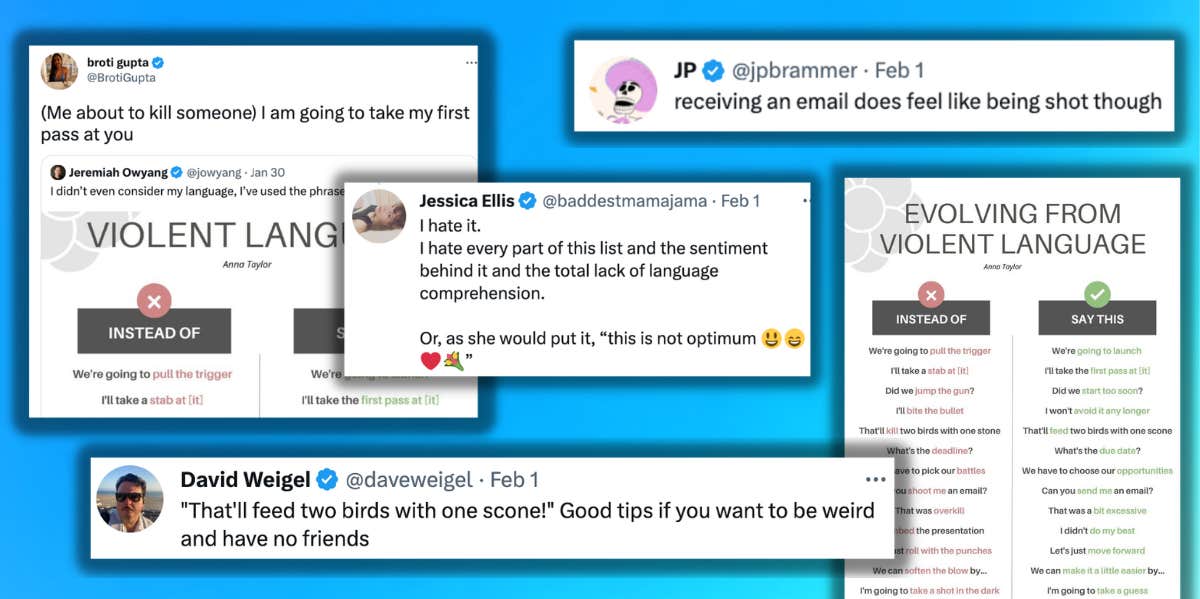List Of Proposed 'Non-Violent' Versions Of Common Sayings Like 'Deadline' Has People Majorly Divided
Many of us are trying to do better with language, but this is just a ridiculous bridge too far.
 @brotigupta, @baddestmamajama, @jpbrammer, @daveweigel, @jowyang/Twitter; Canva
@brotigupta, @baddestmamajama, @jpbrammer, @daveweigel, @jowyang/Twitter; Canva Many of us are trying nowadays to be more thoughtful and inclusive in the way we use language as our world becomes ever more diverse.
But is it possible to take this stuff just a bit too far?
Don't worry, this isn't one of those overwrought, bad-faith far-right screeds about how the "woke" use of langugage spells the collapse of Western civilization.
But a recent list of proposed "non-violent" updates to common idioms has struck much of the internet as frustratingly absurd.
RELATED: What It Really Means To Be ‘Woke’ & Why It’s So Controversial
The list, titled 'Evolving From Violent Language,' has gone viral on Twitter.
Proposing changing common idioms like "kill two birds with one stone" to make them non-violent, the suggestions have struck many as ridiculous.
The list includes several everyday sayings that include words like "kill" or "beat," or that pertain to gunfire or other forms of violence.
We're talking sayings like "kill two birds with one stone," "jump the gun" or "bite the bullet"—harmless in their actual meanings but violence-based in their most literal and reductive interpretations.
The theory goes that we should, as the list instructs, "evolve" beyond these sayings in order to remove violence from our speech.
Presumably, the goal is to address America's inherent culture of violence by acknowledging the ways it has infiltrated even our idioms.
One could certainly argue that metaphors of murder and violence being part of everyday speech upholds the sludge we're all steeping in by living in a country that had 39 mass shootings in the first three weeks of January 2023 alone.
But just because you can argue a thing doesn't mean you should, and in the case of this particular argument, it has struck man as ludicrous.
Many of the supposedly 'violent' phrases in the 'Evolving From Violent Language' list aren't even violent in the first place.
The proposed change that seemed to inspire the most ire is "feed two birds with one scone," a suggestion so intergalactically dippy it seems like it cannot possibly be in earnest.
But some of the other suggestions are arguably far worse. Take, for example, the phrase "jump the gun" being changed to "did we start too soon?"
As many pointed out on Twitter, "jump the gun" is about a starter pistol—you know, the thing that starts a relay race at a track meet?
Sure, it's still a gun, but in the sense that a squirt gun is a gun, or a child's Easy Bake Oven is a metallurgical blast furnace.
But somehow, the "scone" thing and the "jump the gun" thing aren't even the most farcical entries on this list.
It's hard to decide which ones are, but I nominate the following.
Firstly, in what world and by what logic and via what means is the phrase "that's not a bad idea" violent?
Is it the word "bad" or the word "idea" that has the writer of this list, Anna Taylor, running for the exits and ducking under a desk?
But more importantly, "that's not a bad idea" and "that's a good idea" have two entirely different meanings.
Imagine your partner asks you how they look in a shirt they're wearing and you want to avoid drama. Are you saying "good" or "not bad"?
If you say "not bad" you are getting served divorce papers, and rightfully so. Words mean things!
Policing language in the way the 'Evolving From Violent Language' list proposes does not do anything about social or political problems.
This list reminded me of a viral tweet from 2019 in which it was proposed that the phrase "blind spot" was ableist and "dead angle" should be used instead.
Tellingly, when asked to do so, the tweeter was unable to cogently explain how "blind spot" was ableist in the first place.
But the more important issue at hand is—what does this actually address?
Does it rectify, say, the lack of accessible public transit in most American cities? Or the bigotry toward disabled people that underpins ableism?
Of course not, any more than saying "feed two birds with one scone" addresses animal abuse or "did we start to soon?" addresses gun violence.
But if you need a more convincing example of how absurd this is, consider that this activist's proposed alternative, "dead angle," would be deemed "violent" by the "Evolving from Violent Language" list.
You quite literally can't win when you are this prescriptive about language, and it accomplishes nothing.
Well, that's not entirely true. It does accomplish one thing—it fuels the fire of those who insist that wanting to make the world better is weak-spined, "woke" nonsense that infringes on people's rights to be violent bigots.
And it gets people talking about words and language instead of issues, policy, harm and solutions.
Imagine if the people who spent time compiling these lists poured that effort into addressing actual problems and doing actual work?
We'd have a lot less arguing on the internet and a lot more progress toward a better world. We'd kill two birds with one stone.
Er, sorry, "feed two birds with one scone," that is. Apologies for the violence!
John Sundholm is a news and entertainment writer who covers pop culture, social justice and human interest topics.

